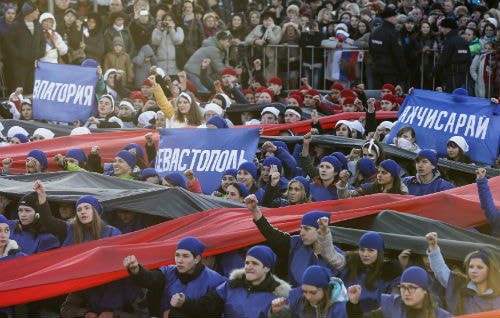One year since Crimea annexed by Russia: What has Russia "gained" and "lost"?
(Baonghean) - It has been exactly one year since the annexation of Crimea into Russia. After one year, the Crimea incident seems to not be mentioned much, but everyone understands that it is an important event in the current Ukraine crisis and is the root cause of the most intense confrontation between Russia and the West since the Cold War. From Russia's perspective, the annexation of Crimea has brought many "gains", but also many "losses".
(Baonghean) - It has been exactly one year since the annexation of Crimea into Russia. After one year, the Crimea incident seems to not be mentioned much, but everyone understands that it is an important event in the current Ukraine crisis and is the root cause of the most intense confrontation between Russia and the West since the Cold War. From Russia's perspective, the annexation of Crimea has brought many "gains", but also many "losses".
 |
| Crimean people on the 1st anniversary of annexation to Russia - Photo: Reuters |
By annexing Crimea, Russia declared that it had “reclaimed” the territory it thought it had lost. This was clearly demonstrated in the speech of Russian President V. Putin on March 18, 2014 - exactly 1 year ago. The Kremlin leader once praised that this victory would be recorded in the annals of Russia. It must be reiterated that it is difficult to calculate all the value of the Crimean peninsula, such as offshore oil and gas resources when Russia's territorial waters and exclusive economic zone are expanded, or its geopolitical position that controls the maritime security of a series of countries around the Black Sea. Taking over bases and fleets in Crimea has helped the Black Sea Fleet in particular and the Russian army to increase their influence and develop in an important area, considered the “key to the sea”.
Russia can now fully exploit the peninsula’s geostrategic potential with a range of support tools that no rival in the region can match. For example, Russia can deploy Iskander tactical ballistic missiles with a range of 400km, covering the entire southern part of Ukraine; including important industrial cities such as Odessa, Kryvyi Rih and Dnipropetrovsk; most of Moldova; the entire Romanian coast and part of the Turkish Black Sea coast. Russian Defense Minister Sergei Shoigu recently said that one year after its annexation to the Russian Federation, Crimea has become one of the key points in the country’s military policy. Crimea is now an outpost between East and West that the Russian navy, air force and army are ready to defend if necessary.
As for Mr. Putin himself, since the annexation of Crimea, the leader's reputation has been constantly increasing and always stable. If in March 2014, a survey by the Russian non-governmental research organization, the Levada Center, showed that Mr. Putin's approval rating reached a record high of 80%, now this rate is at 88% according to the latest figures released last week. This is a number that any Western leader would dream of. The reason why the Russian people support their leader is simply because Mr. Putin has helped them regain Russia's position and values.
Of course, every victory has its price. The annexation of Crimea has caused the most tense confrontation between Russia and the West since the Cold War. Until now, the US and European countries have continuously increased criticism of Russia and do not recognize Russia's annexation of Crimea. A year ago, US tanks did not exercise near the Russian border. And the ruble is still stable at 33 rubles/USD. But just a few days after Russia annexed Crimea, the number of NATO fighter jets patrolling the skies over the Baltic countries has tripled. US tanks continuously exercise in Latvia, close to the Russian border. In November 2014, US tanks even marched on the streets of Riga to celebrate Latvia's independence day. It is also easy to see that the Black Sea has never been as "stormy" as it has been in recent days with a series of large-scale exercises by NATO and Russia. The West does not hide its strong ambitions towards the East. To implement this strategy, they cannot help but calculate to narrow Russian influence in the traditional space. In which, the Black Sea is a particularly sensitive area.
Another “loss” for Russia since the annexation of Crimea is the loss of trust from its Western friends. Germany, one of Russia’s biggest trading partners in Europe, is also turning its back on Russia. A few weeks after Russia annexed Crimea, nearly half of Germans said the government should not take sides in the conflict, while 35% urged German leaders to engage in dialogue to understand Moscow’s approach. However, after the events in Ukraine, German support for Russia seems to have evaporated.
In a poll conducted late last year, 76% of respondents supported German Chancellor A. Merkel's tougher stance on Russia. In the economic field, Western sanctions against Russia are becoming increasingly severe. The Western blockade and falling crude oil prices have pushed the Russian economy into recession; forecasts are around 3-5% in 2015, unemployment rate increased to 7%, capital outflows reached 150 billion USD in 2014. The ruble's value has fallen sharply, pushing Russia's inflation rate to more than 16%, and prices of all goods have skyrocketed. The lives of Russians have become more difficult.
Thus, by gaining Crimea, Russia has expanded geographically, taking control of an important geopolitical position, but the price to pay for this “victory” is clearly not small. March 18, 2014 marked the opening of a new page in history for the people of Crimea and for Russia as a whole, but its consequence is a confrontation with the West that is unknown when it will end.
Thanh Huyen






